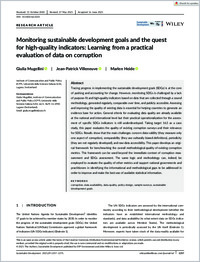Monitoring sustainable development goals and the quest for high-quality indicators : learning from a practical evaluation of data on corruption
- Mugellini, Giulia ORCID Istituto di comunicazione e politiche pubbliche (ICPP), Facoltà di comunicazione, cultura e società, Università della Svizzera italiana, Svizzera
- Villeneuve, Jean-Patrick ORCID Istituto di comunicazione e politiche pubbliche (ICPP), Facoltà di comunicazione, cultura e società, Università della Svizzera italiana, Svizzera
- Heide, Marlen ORCID Istituto di comunicazione e politiche pubbliche (ICPP), Facoltà di comunicazione, cultura e società, Università della Svizzera italiana, Svizzera
- 2021
Published in:
- Sustainable development. - 2021, vol. 29, no. 6, p. 1257-1275
Corruption
Data availability
Data quality
Policy design
Sample surveys
Sustainable development goals
English
Tracing progress in implementing the sustainable development goals (SDGs) is at the core of pushing and accounting for change. However, monitoring SDGs is challenged by a lack
of purpose-fit and high-quality indicators based on data that are collected through a sound
methodology, generated regularly, comparable over time, and publicly accessible. Assessing and improving the quality of existing data is essential for helping countries to generate an evidence base for action. General criteria for evaluating data quality are already available at the national and international level but their practical operationalization for the assessment of specific SDGs indicators is still underdeveloped. Taking target 16.5 as a case study, this paper evaluates the quality of existing corruption surveys and their relevance for SDGs. Results show that the main challenges concern data validity (they measure only one aspect of corruption), comparability (they use culturally biased definitions), periodicity (they are not regularly developed), and raw-data accessibility. This paper develops an original framework for benchmarking the overall methodological quality of existing corruption metrics. This framework can be used beyond the immediate context of corruption measurement and SDGs assessment. The same logic and methodology can, indeed, be employed to evaluate the quality of other metrics and support national governments and practitioners in identifying the informational and methodological gaps to be addressed in order to improve and make the best use of available statistical information.
of purpose-fit and high-quality indicators based on data that are collected through a sound
methodology, generated regularly, comparable over time, and publicly accessible. Assessing and improving the quality of existing data is essential for helping countries to generate an evidence base for action. General criteria for evaluating data quality are already available at the national and international level but their practical operationalization for the assessment of specific SDGs indicators is still underdeveloped. Taking target 16.5 as a case study, this paper evaluates the quality of existing corruption surveys and their relevance for SDGs. Results show that the main challenges concern data validity (they measure only one aspect of corruption), comparability (they use culturally biased definitions), periodicity (they are not regularly developed), and raw-data accessibility. This paper develops an original framework for benchmarking the overall methodological quality of existing corruption metrics. This framework can be used beyond the immediate context of corruption measurement and SDGs assessment. The same logic and methodology can, indeed, be employed to evaluate the quality of other metrics and support national governments and practitioners in identifying the informational and methodological gaps to be addressed in order to improve and make the best use of available statistical information.
- Collections
- Language
-
- English
- Classification
- Social work
- License
- Open access status
- hybrid
- Identifiers
-
- DOI 10.1002/sd.2223
- ARK ark:/12658/srd1321153
- Persistent URL
- https://n2t.net/ark:/12658/srd1321153
Statistics
Document views: 133
File downloads:
- Mugellini_2021_Wiley_susdevelopment: 226
